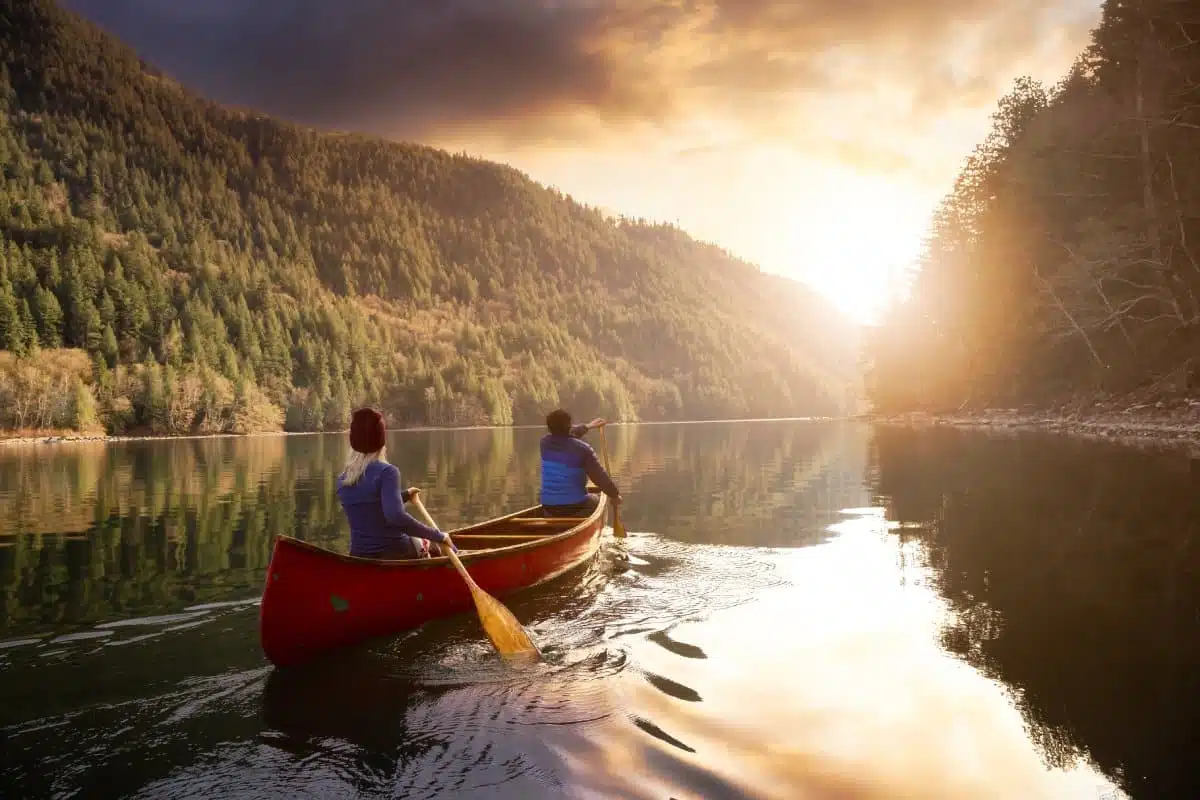Canoeing offers an intimate connection with water unlike any other, blending physical challenge with serene exploration. Selecting the right destination is crucial for those looking to embark on this journey. This guide delves into premier locations worldwide, ideal for novice and seasoned paddlers. Each spot is chosen for its unique blend of natural beauty, water conditions, and learning environments.
Top Tips for Learning to Canoe
Here are the top tips for beginners learning how to canoe:
Start with a Lesson
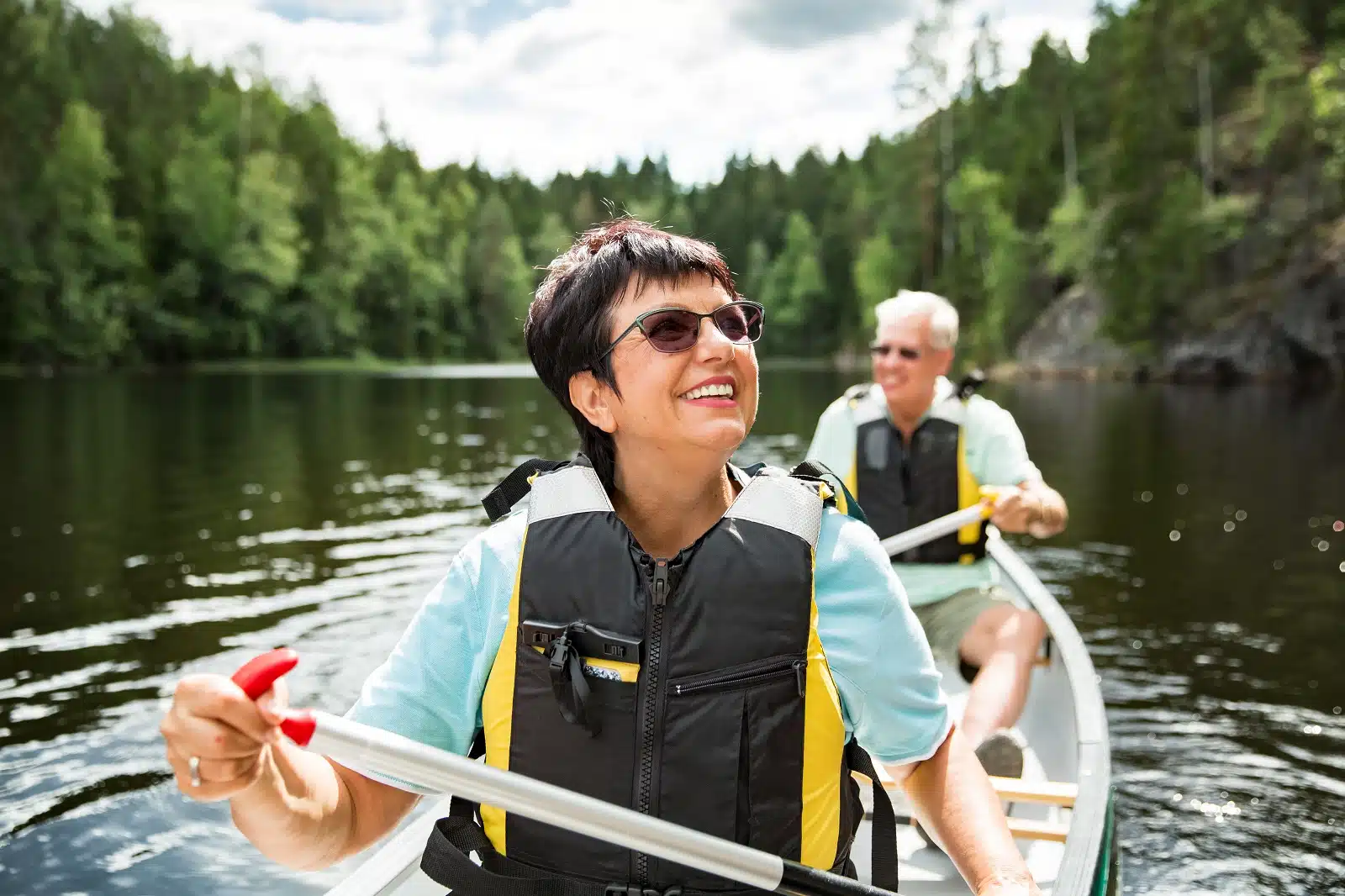
Image Credit: Shutterstock / Aleksandra Suzi
Even if you’re eager to get going, a structured lesson from a certified instructor can provide you with the foundational skills and safety knowledge necessary for canoeing. This will help you learn proper paddling techniques, canoe control, and safety procedures.
Choose the Right Equipment
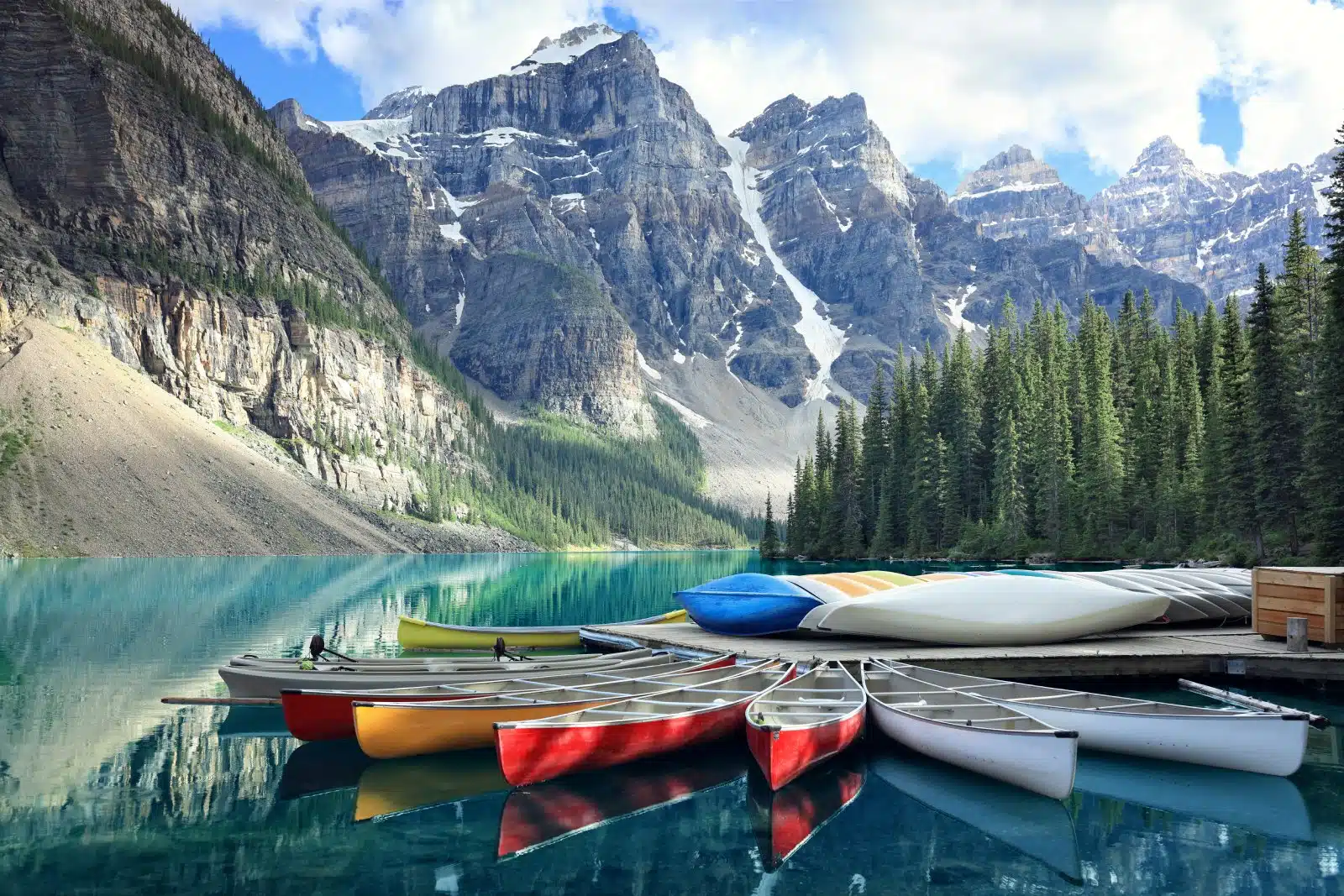
Image Credit: Shutterstock / Brian A Jackson
Selecting a stable, beginner-friendly canoe is crucial. Look for wider, flatter-bottom canoes that offer more stability on the water. Ensure your paddle is the right size for your height and strength, and always wear a properly fitted life jacket, regardless of your swimming abilities.
Learn the Basic Strokes
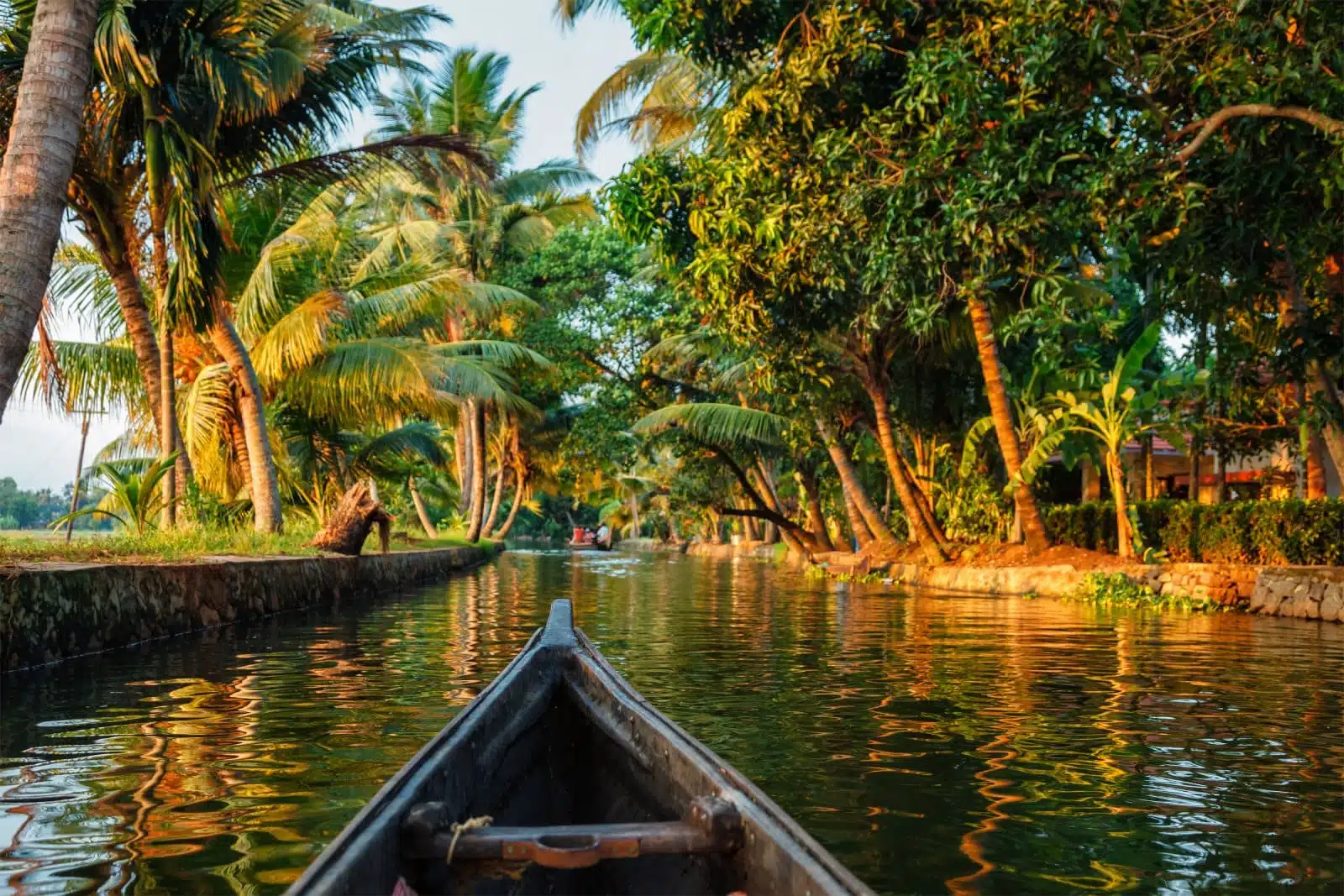
Image Credit: Shutterstock / Dmitry Rukhlenko
Familiarize yourself with the essential paddling strokes, such as the forward, reverse, and J-stroke. These will help you navigate and control the canoe effectively. Practice these strokes in calm, shallow water before heading out further.
Practice Capsizing
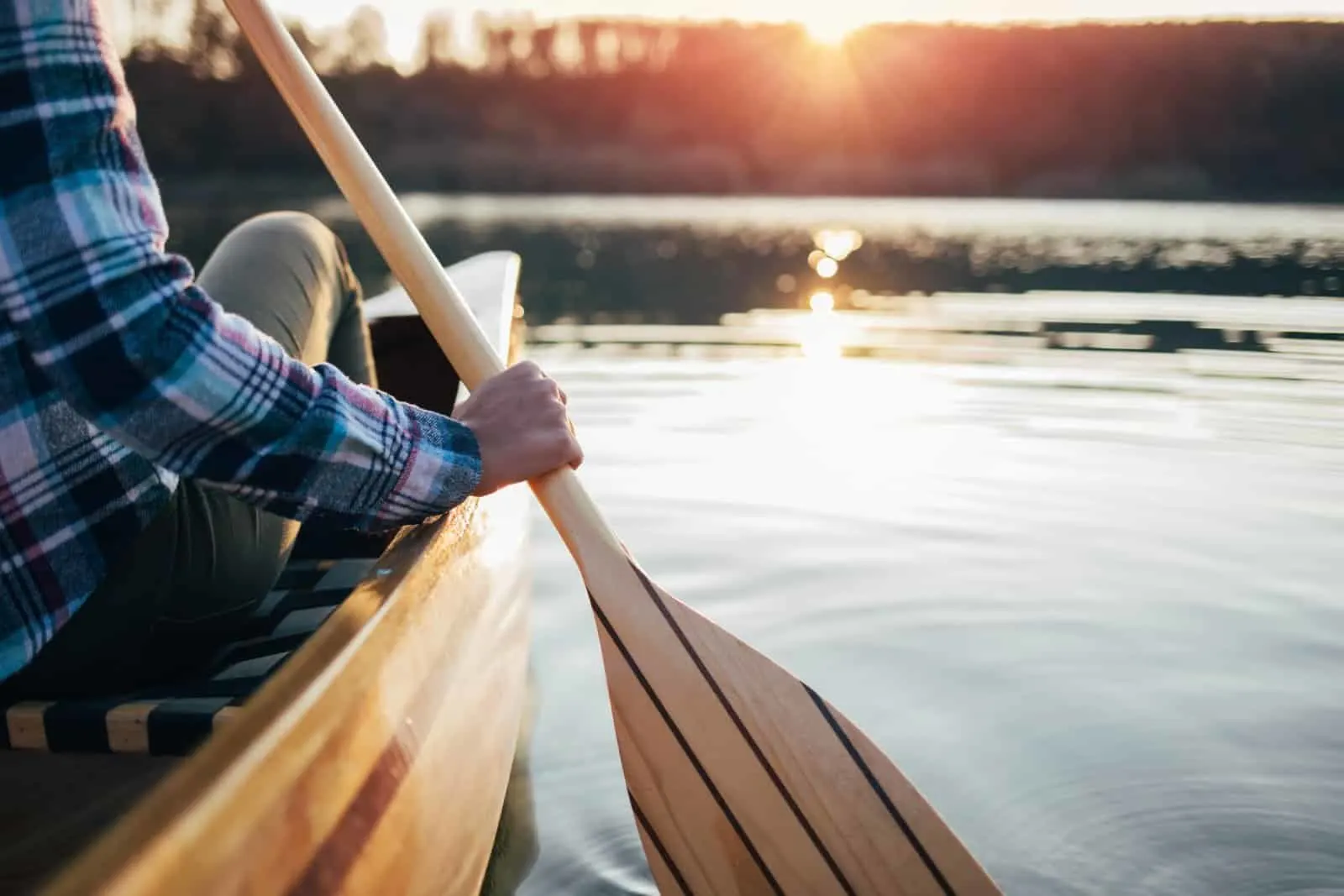
Image Credit: Shutterstock / Popartic
While it might seem counterintuitive, knowing how to handle a capsized canoe is vital. Practice capsizing and re-entering your canoe in a safe, controlled environment. This will reduce panic and increase your confidence on the water.
Understand Water Safety
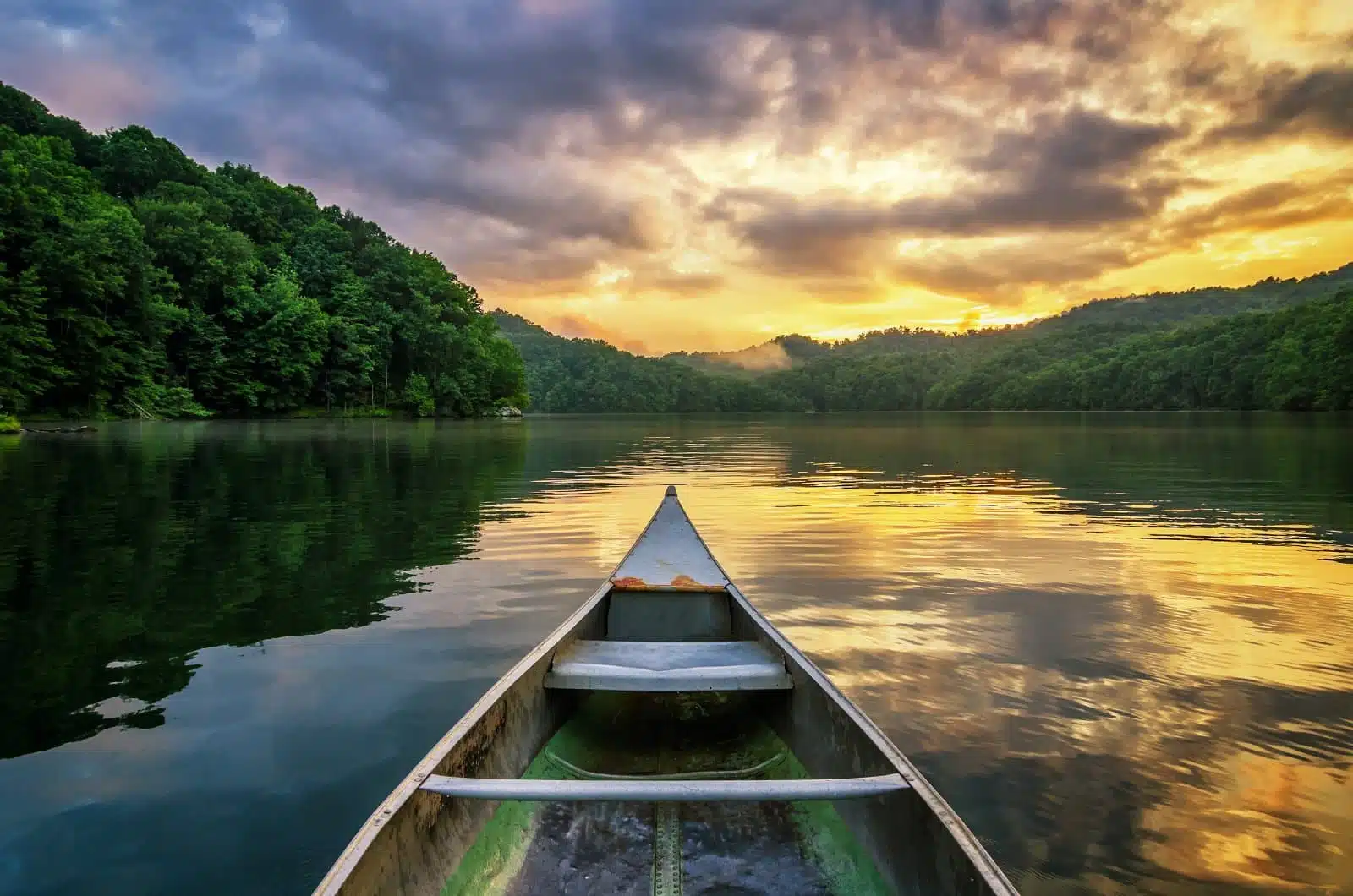
Image Credit: Shutterstock / anthony heflin
Educate yourself on water safety rules and regulations, including how to read water conditions and weather patterns. Always check the weather before heading out and avoid canoeing in adverse conditions.
Plan Your Route
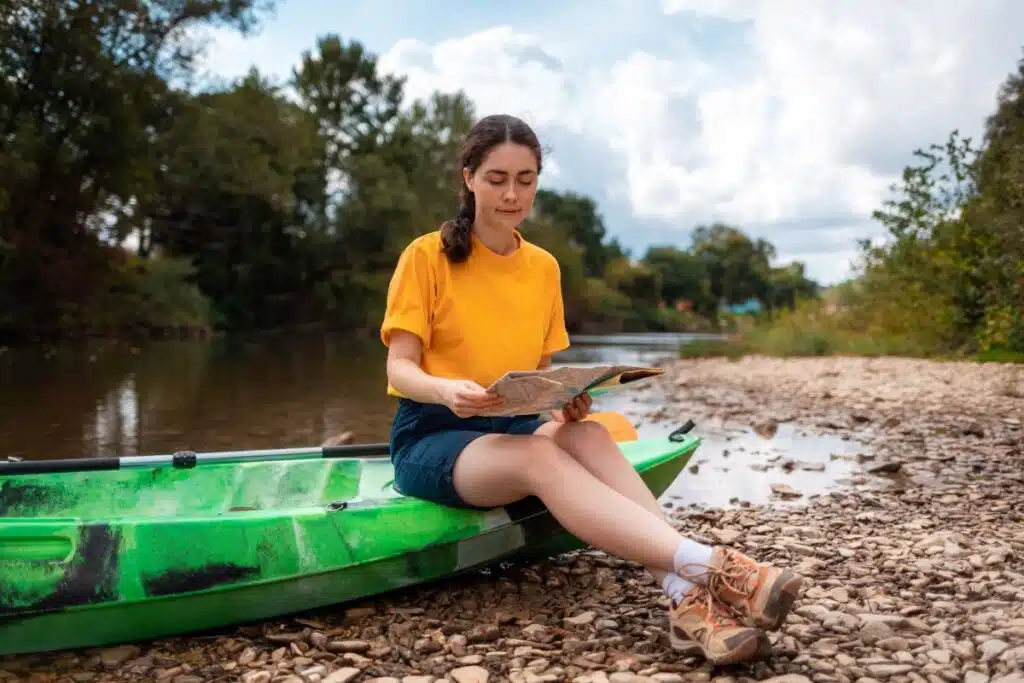
Image credit: Shutterstock / STEKLO
Start with short, simple routes on calm water. As you gain confidence and skill, you can gradually progress to longer trips or more challenging waters. Always let someone know your planned route and expected return time.
Stay Near the Shore
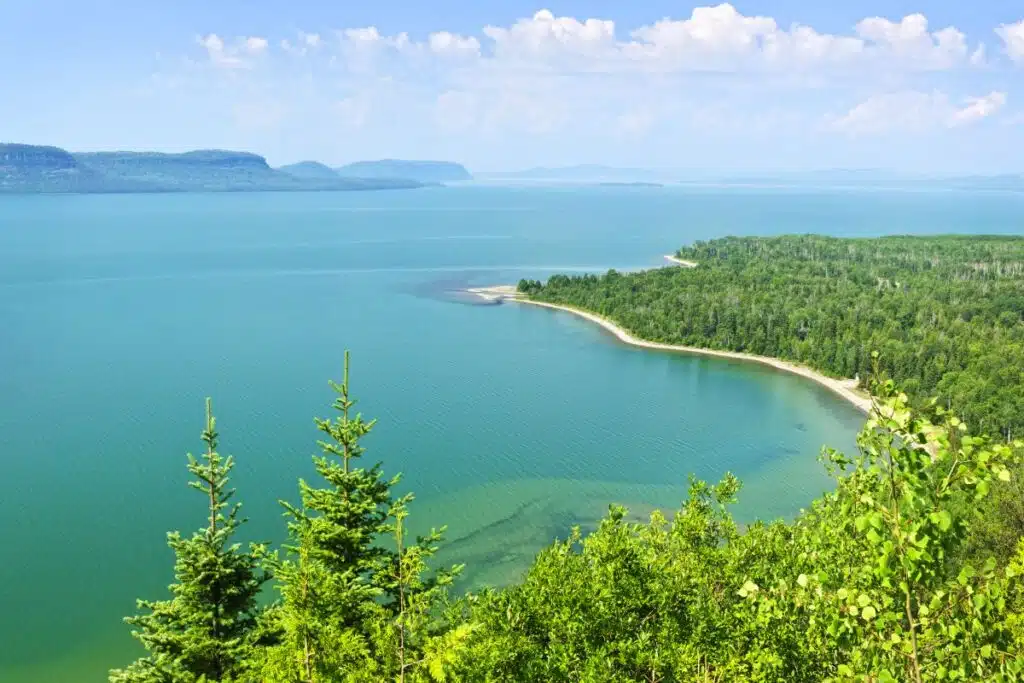
Image credit: Shutterstock / Elena Elisseeva
When starting out, paddle close to the shore, where you can easily get help if needed. This also makes it easier to navigate back if you get tired or encounter difficulties.
Balance Your Load
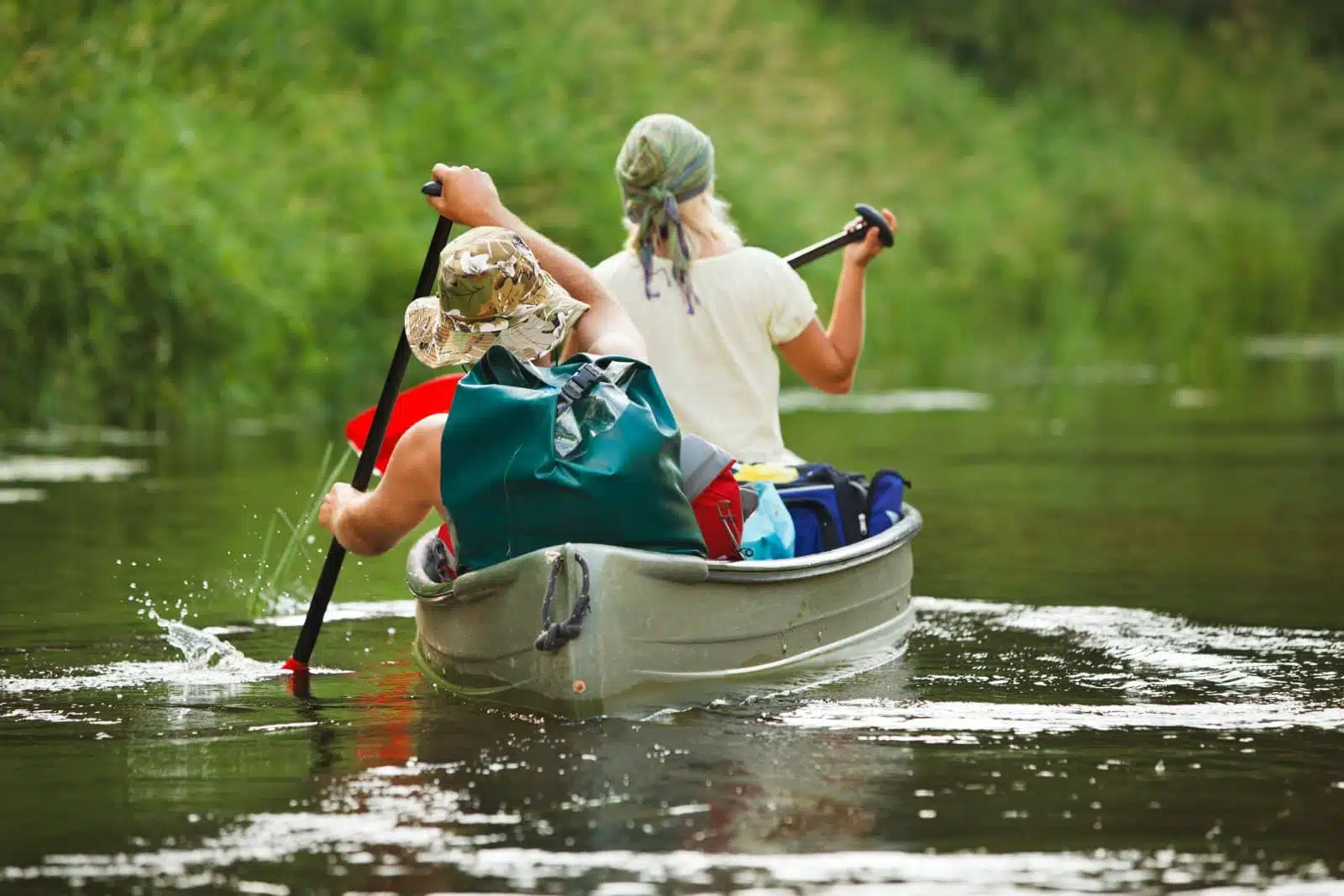
Image Credit: Shutterstock / Inc
Properly distribute weight in the canoe for stability. Keep heavier items low and centered in the boat, and secure loose items to prevent them from moving or falling out if you capsize.
Dress Appropriately

Image credit: Shutterstock / StoryTime Studio
Wear clothing suitable for the water temperature, not the air temperature, and be prepared for all weather conditions. Quick-drying materials and layers are ideal. Don’t forget sunscreen, a hat, and sunglasses for protection against the sun.
Stay Hydrated and Energized

Image Credit: Shutterstock / PeopleImages.com – Yuri A
Bring enough water and snacks, especially for longer trips. Staying hydrated and energized is crucial for maintaining strength and focus while paddling.
By following these tips and gradually building your skills and experience, you’ll be able to enjoy the many rewards of canoeing safely and confidently. Remember, every paddler starts as a beginner, and the journey of learning is part of the adventure.
1. Boundary Waters Canoe Area Wilderness, USA
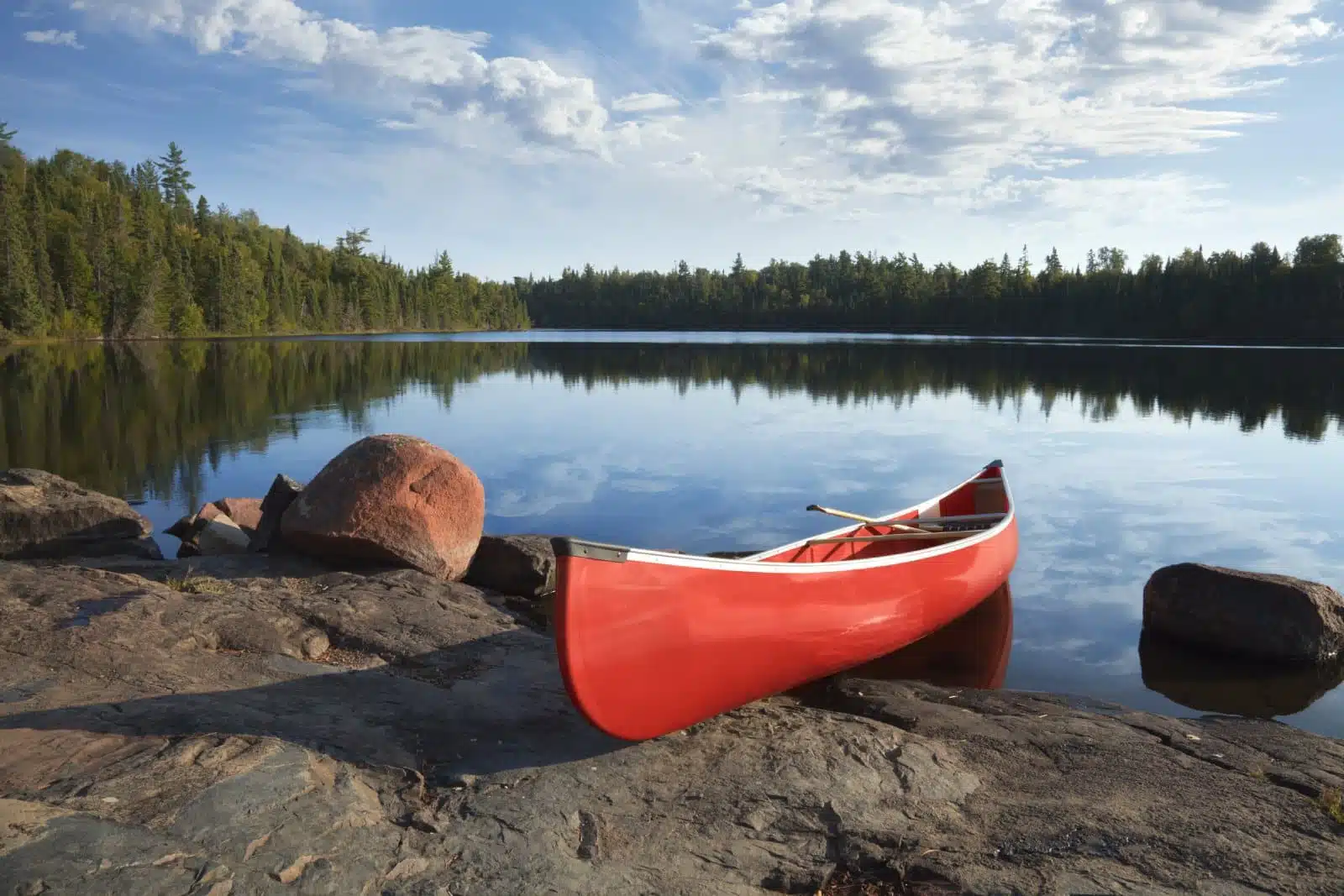
Image Credit: Shutterstock / Dan Thornberg
The Boundary Waters Canoe Area Wilderness (BWCAW) in Minnesota is a vast network of lakes and rivers, offering over 1,500 miles of canoe routes. This pristine wilderness area is renowned for its clear waters, dense forests, and abundant wildlife. The BWCAW provides a variety of water conditions, from calm lakes to gentle rivers, making it an ideal location for beginners to learn canoeing while experiencing the tranquility of untouched nature. The area is also a haven for fishing, camping, and wildlife observation, offering a comprehensive outdoor adventure.
Insider’s Tip: For a truly immersive experience, consider hiring a local guide. Not only will they provide valuable canoeing instruction, but they’ll also share hidden gems off the beaten path.
When to Travel: The best time to visit is from late spring to early fall, with June to September offering the most favorable weather conditions.
How to Get There: The nearest major airport is in Duluth, Minnesota. From there, it’s a scenic drive to the entry points of the BWCAW, with Ely being a popular gateway.
2. The Dordogne River, France
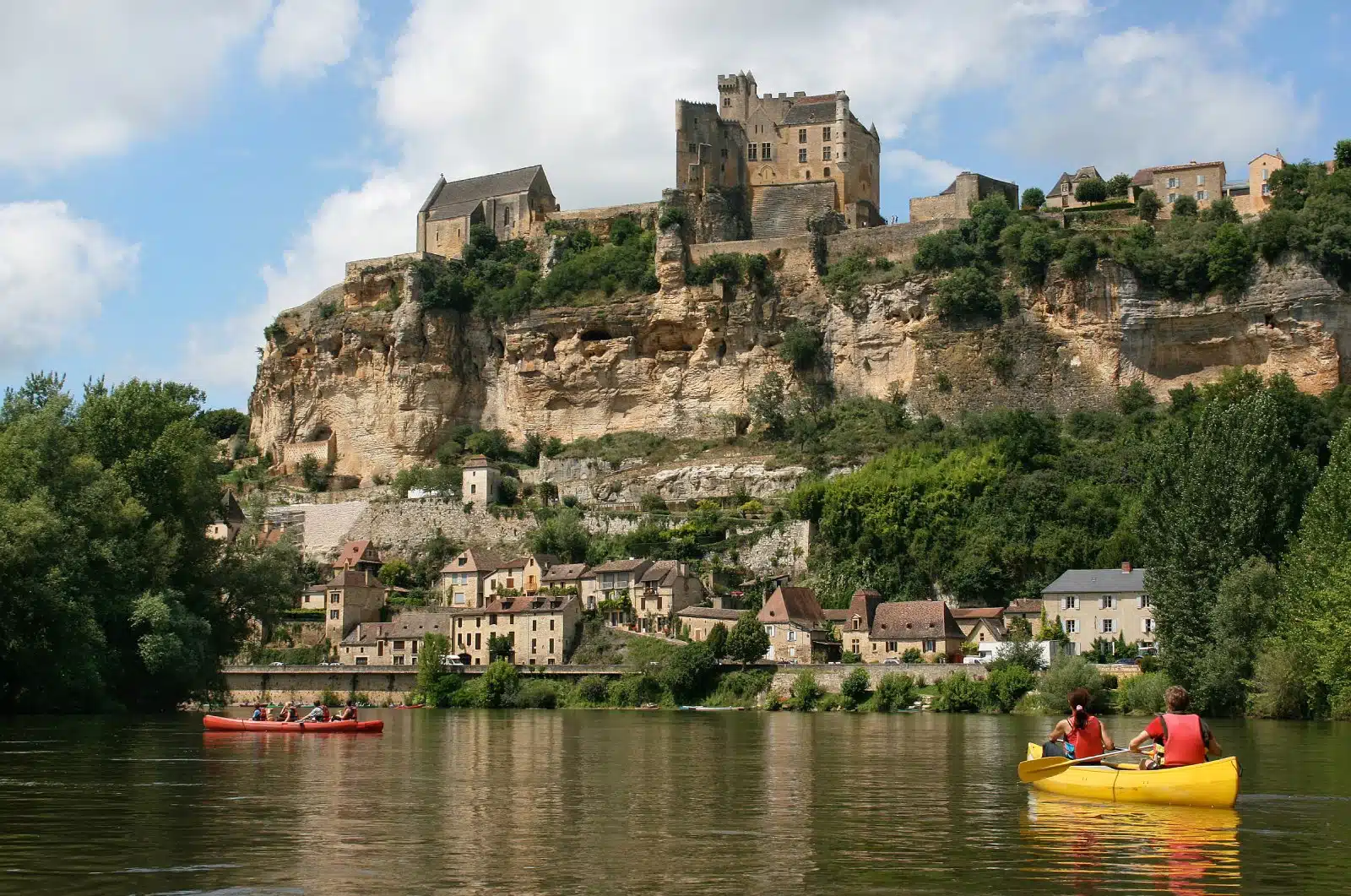
Image Credit: Shutterstock / canadastock
Flowing through the heart of the picturesque Dordogne region, this river offers a gentle yet captivating canoeing experience. The Dordogne is famed for its scenic beauty, passing medieval towns, ancient castles, and stunning cliffs. Canoeing here allows for easy paddles, with ample opportunities to stop and explore the rich cultural heritage along its banks. The river’s calm waters are perfect for beginners, providing a safe environment to learn and practice canoeing skills.
Insider’s Tip: Plan stops at the historic towns of La Roque-Gageac and Beynac-et-Cazenac for a blend of history and stunning river views.
When to Travel: Late spring to early autumn, with May to October offering the best combination of warm weather and water levels suitable for canoeing.
How to Get There: Fly into Bordeaux or Toulouse, then drive or take a train to the Dordogne region. Canoe rental and tour companies are plentiful along the river.
3. Algonquin Provincial Park, Canada
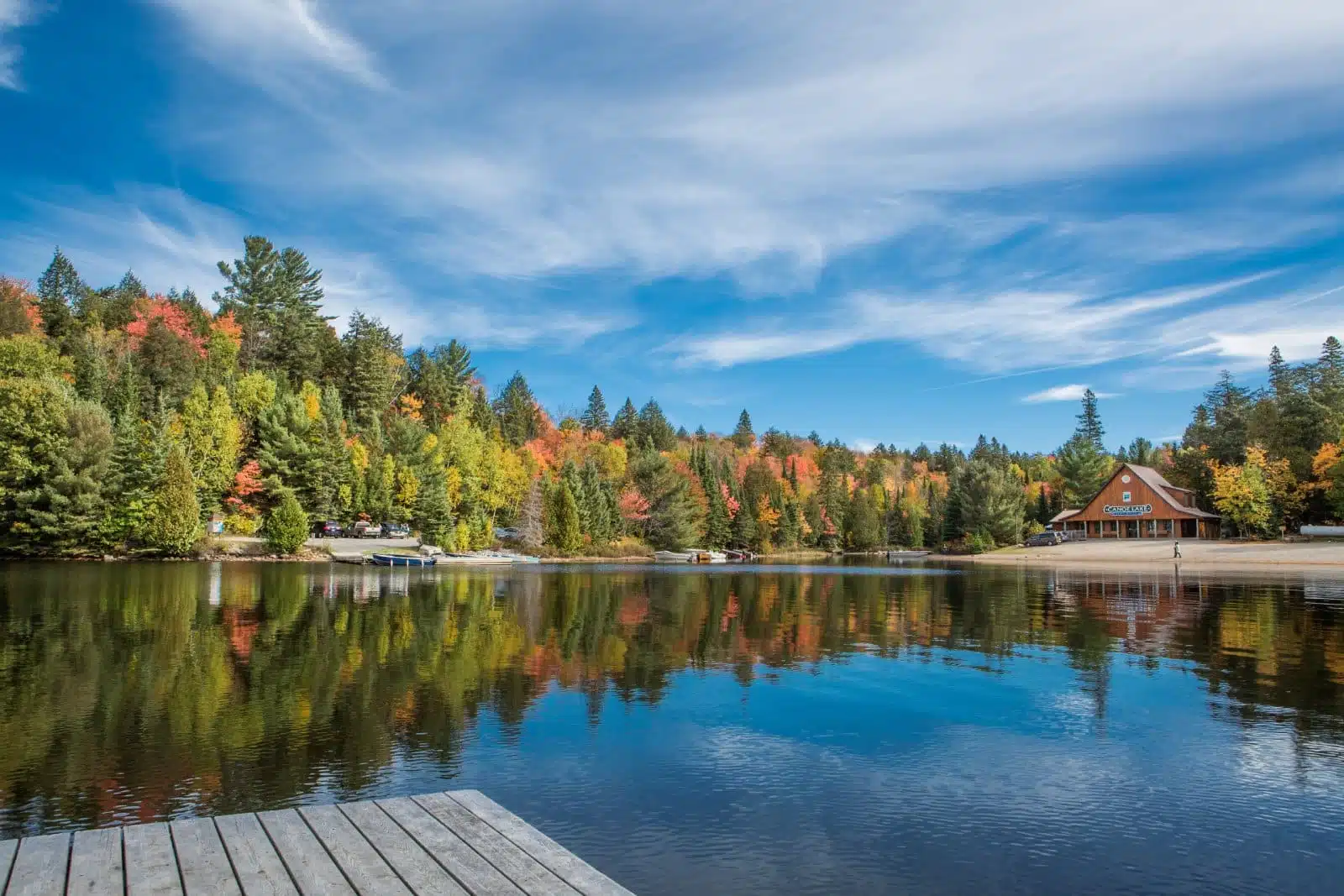
Image Credit: Shutterstock / Ping Ye
Algonquin Provincial Park in Ontario is a premier canoeing destination, offering a mosaic of lakes, rivers, and forests. Its vast wilderness supports a diverse ecosystem, making wildlife encounters a part of the experience. The park’s waterways range from placid lakes to moderately challenging rivers, which are suitable for learning different canoeing techniques. Algonquin’s backcountry provides a true escape, with countless routes offering solitude and adventure.
Insider’s Tip: Take advantage of the park’s ranger-led programs for an educational introduction to canoeing and the local ecosystem.
When to Travel: The best period is from late May to early September, with the fall foliage in September offering a spectacular backdrop.
How to Get There: The closest major city is Toronto, which is a 3-to 4-hour drive to the park’s access points.
4. Lake District, UK
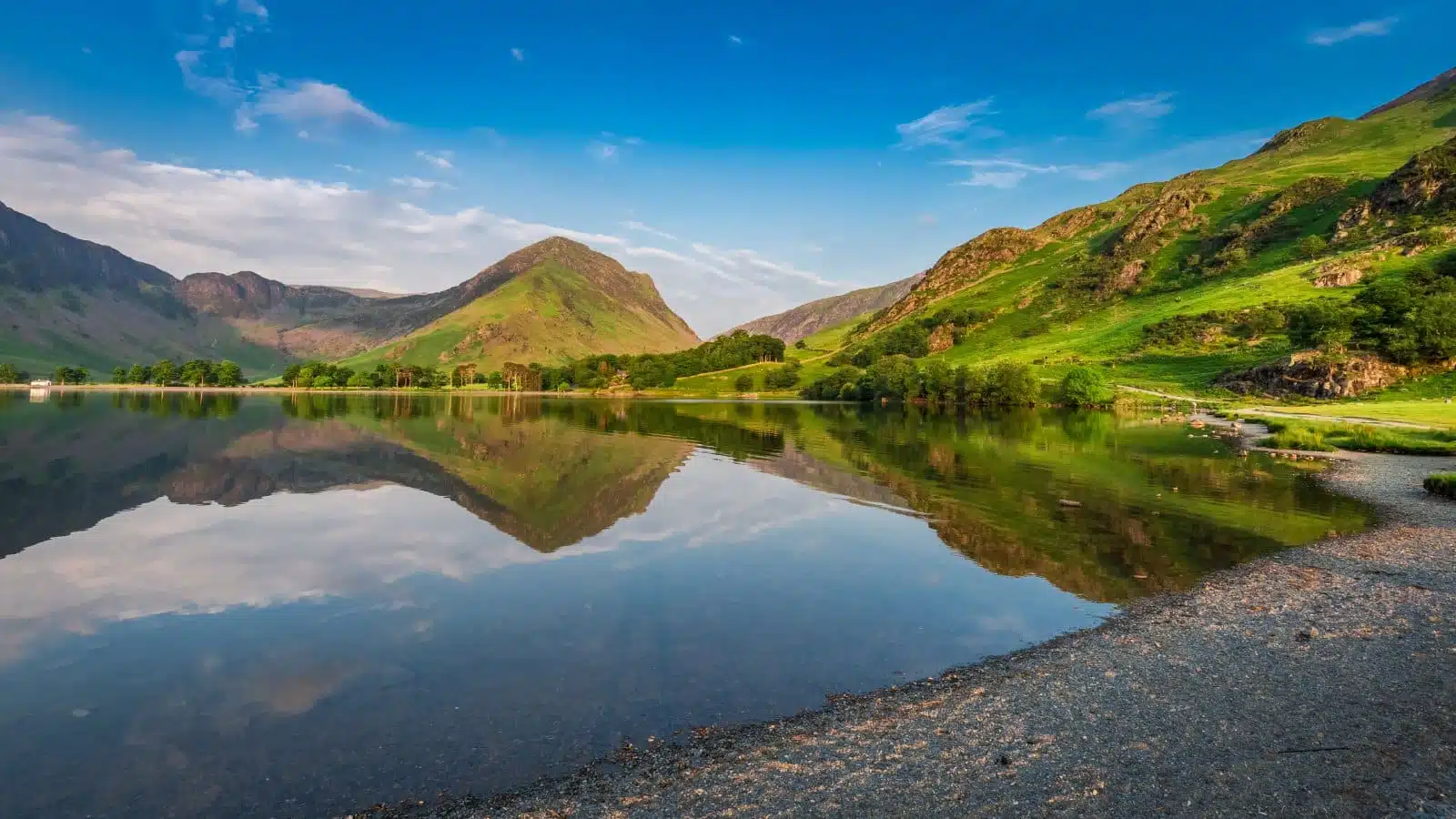
Image Credit: Shutterstock / Shaiith
The Lake District National Park is famed for its stunning landscapes, comprising rolling hills and clear, expansive lakes. It’s a paddler’s paradise, with lakes like Windermere and Derwentwater offering serene waters ideal for beginners. The region is not just about canoeing; it’s a cultural landscape with literary ties to Wordsworth and Beatrix Potter. Canoeing in the Lake District combines physical activity with appreciating natural beauty and cultural heritage.
Insider’s Tip: Explore smaller lakes like Grasmere for a more secluded and intimate paddling experience.
When to Travel: Spring to autumn, with May to September providing the best weather for canoeing.
How to Get There: Manchester is the nearest major airport, with the Lake District accessible by train or car within a couple of hours.
5. The Amazon Basin, South America
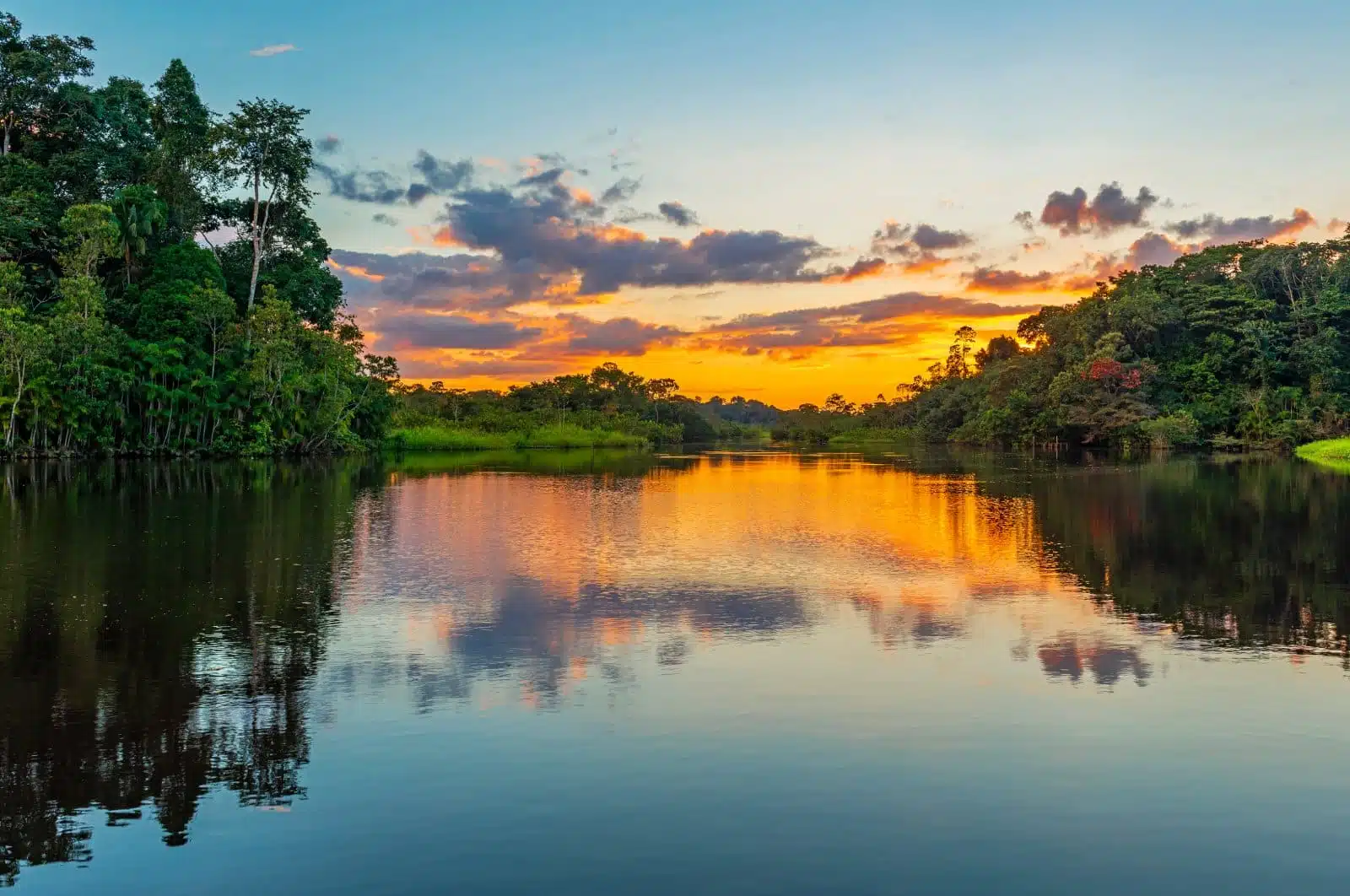
Image Credit: Shutterstock / SL-Photography
For the adventurous learner, the Amazon Basin offers an unparalleled canoeing experience. This biodiverse region allows paddlers to navigate through the heart of the rainforest, observing exotic wildlife and visiting indigenous communities. The vast network of rivers and tributaries presents various conditions, from calm waters to more challenging stretches, suitable for developing a wide range of skills. Canoeing in the Amazon is not just about learning a sport; it’s about experiencing one of the planet’s most vital ecosystems.
Insider’s Tip: Engage with local guides for a safe and insightful journey through the complex river systems.
When to Travel: The dry season, from June to November, offers lower water levels, making it easier to spot wildlife.
How to Get There: International flights commonly arrive in major cities like Manaus, Brazil, from where river trips can be organized.
6. Milford Sound, New Zealand
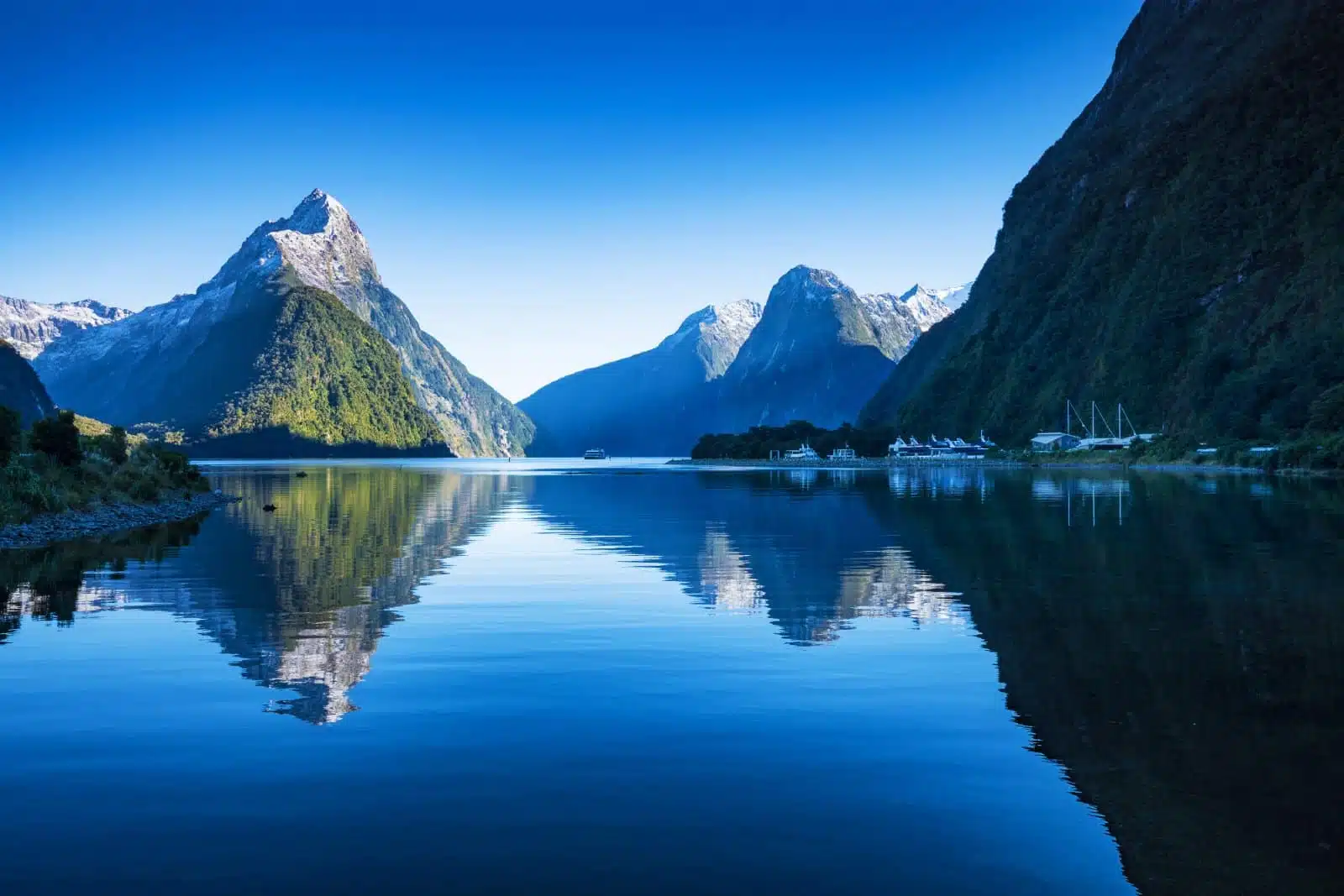
Image Credit: Shutterstock / Somphol
Milford Sound in Fiordland National Park offers a dramatic setting for canoeists, with its towering cliffs, cascading waterfalls, and dark waters. This UNESCO World Heritage site provides a serene yet awe-inspiring environment for paddlers of all skill levels. The fjord’s calm waters are ideal for beginners, while the sheer scale of the landscape offers a unique challenge: navigating while surrounded by some of the world’s most breathtaking scenery. Canoeing in Milford Sound is not just about learning the techniques; it’s about immersing yourself in an environment that showcases the power and beauty of nature.
Insider’s Tip: Consider an early morning paddle to experience the fjord in its most tranquil state, often with mirror-like water reflecting the stunning scenery.
When to Travel: The best time to visit is during the Southern Hemisphere’s summer, from November to March, when the weather is milder and rainfall is less frequent.
How to Get There: The nearest major town is Queenstown, which is accessible by air from major New Zealand cities. It’s a scenic drive from Queenstown to Milford Sound, where canoeing tours and rentals are available.
7. Spreewald, Germany
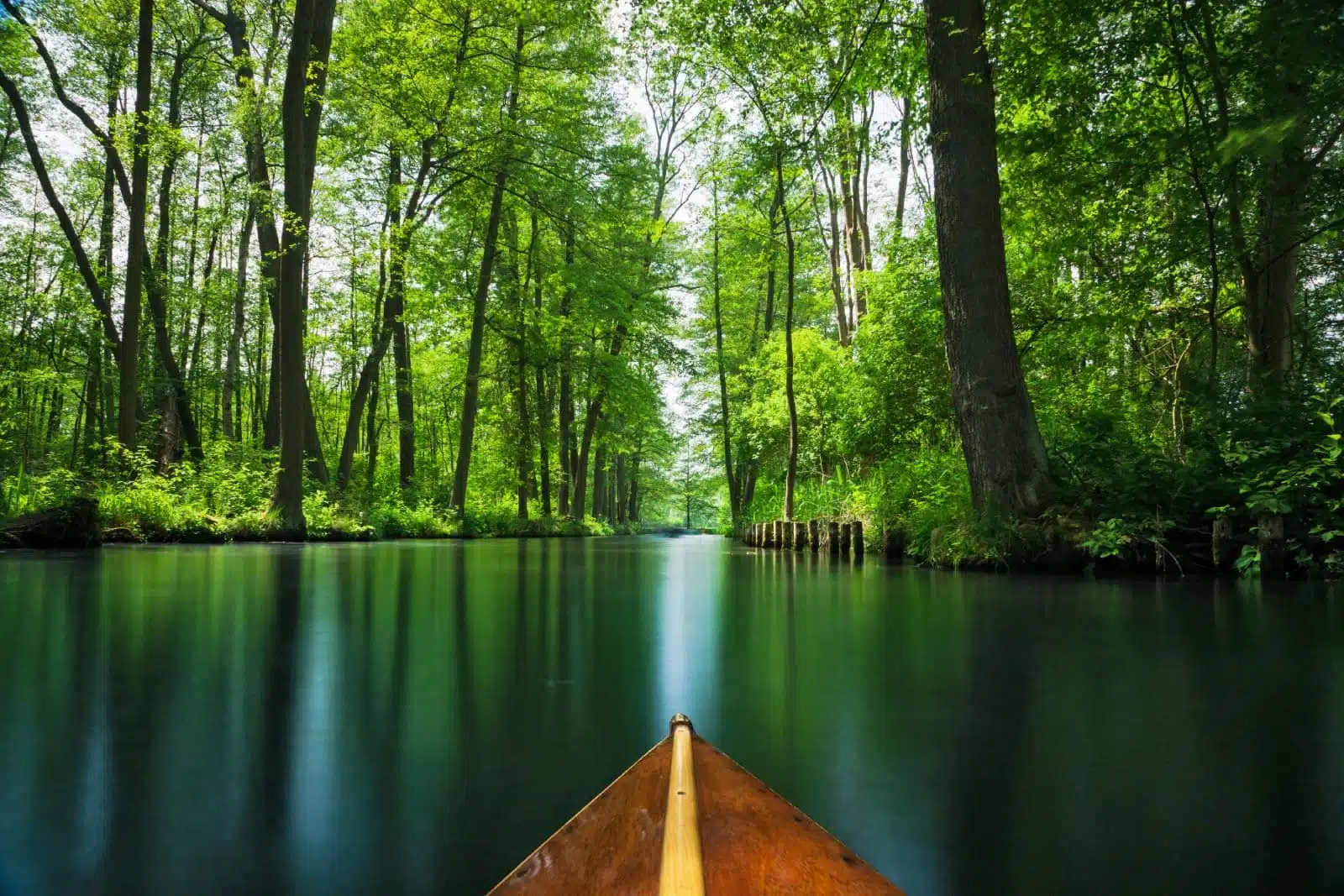
Image Credit: Shutterstock / DanKe
The Spreewald is a unique biosphere reserve located just south of Berlin, characterized by its network of over 200 small waterways (or “Fließe”) winding through lush forested areas and charming villages. This UNESCO-protected area offers a gentle canoeing experience, perfect for beginners. The slow-moving waters and absence of strong currents make it an ideal place to learn paddling techniques while enjoying the picturesque surroundings. The Spreewald is also rich in culture, allowing paddlers to explore traditional Sorbian villages and sample local delicacies like pickles and pumpernickel bread.
Insider’s Tip: Rent a canoe from one of the many boat stations in Lübbenau for access to a wider variety of routes and less crowded waterways.
When to Travel: Spring to early autumn, with May to September offering the most pleasant weather for canoeing.
How to Get There: The Spreewald is easily accessible by car or train from Berlin, making it a perfect day trip or weekend getaway destination.
8. Loch Lomond & The Trossachs National Park, Scotland
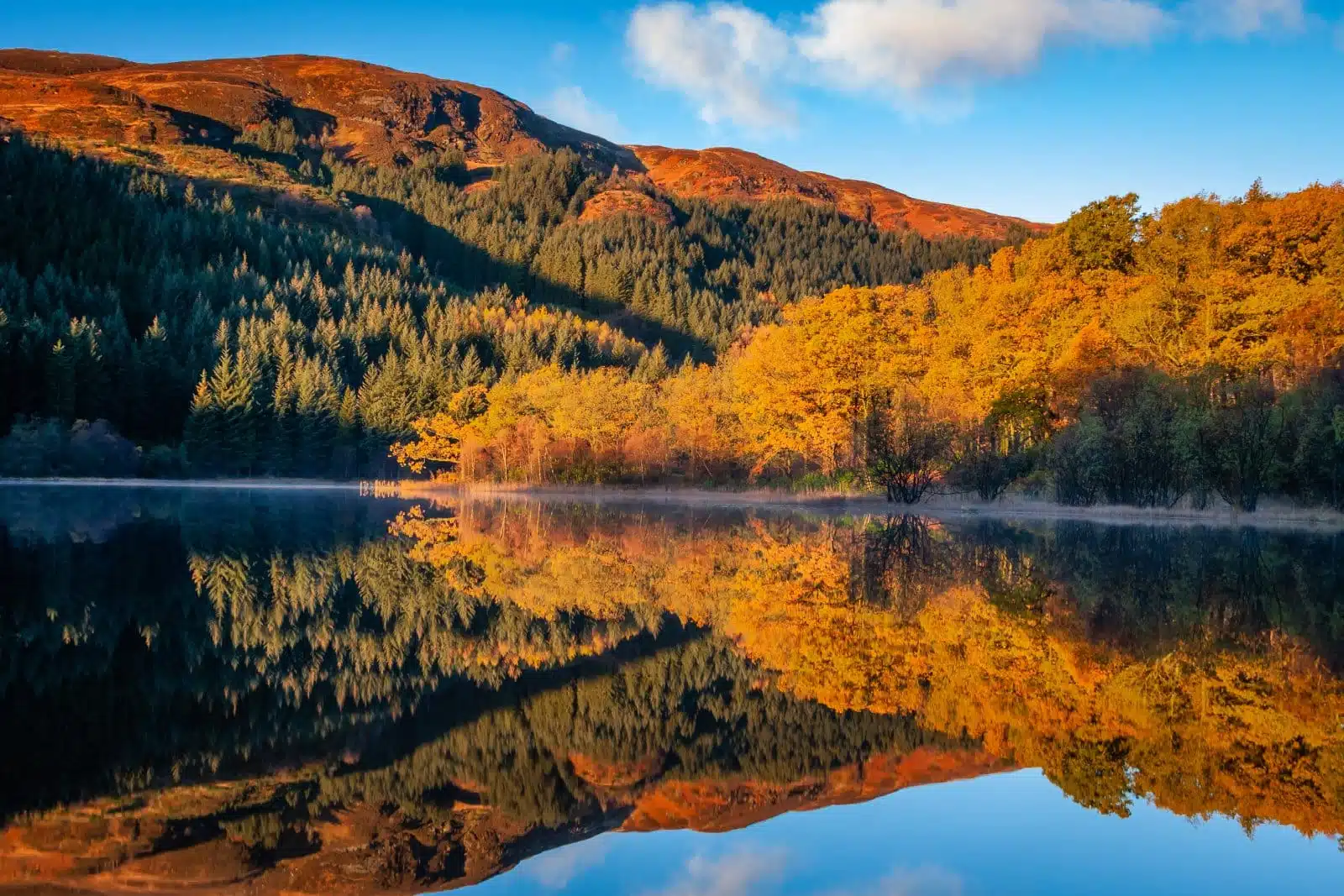
Image Credit: Shutterstock / ALBAimagery
Loch Lomond & The Trossachs National Park offers a quintessentially Scottish canoeing experience with its misty lochs, rugged highlands, and verdant glens. Loch Lomond, the largest inland stretch of water in Great Britain, provides varied conditions for canoeists, from open water to sheltered bays and islands. This diversity makes it an excellent place for beginners to learn and for experienced paddlers to refine their skills. Beyond canoeing, the park’s rich history, wildlife, and hiking trails offer a well-rounded outdoor adventure.
Insider’s Tip: Explore the park’s numerous islands, many of which are open for wild camping, offering a unique overnight canoeing trip opportunity.
When to Travel: Late spring to early autumn, with May to September offering the best conditions for canoeing and camping.
How to Get There: The park is within an hour’s drive from Glasgow, making it easily accessible by car or public transport.
9. The Everglades, USA
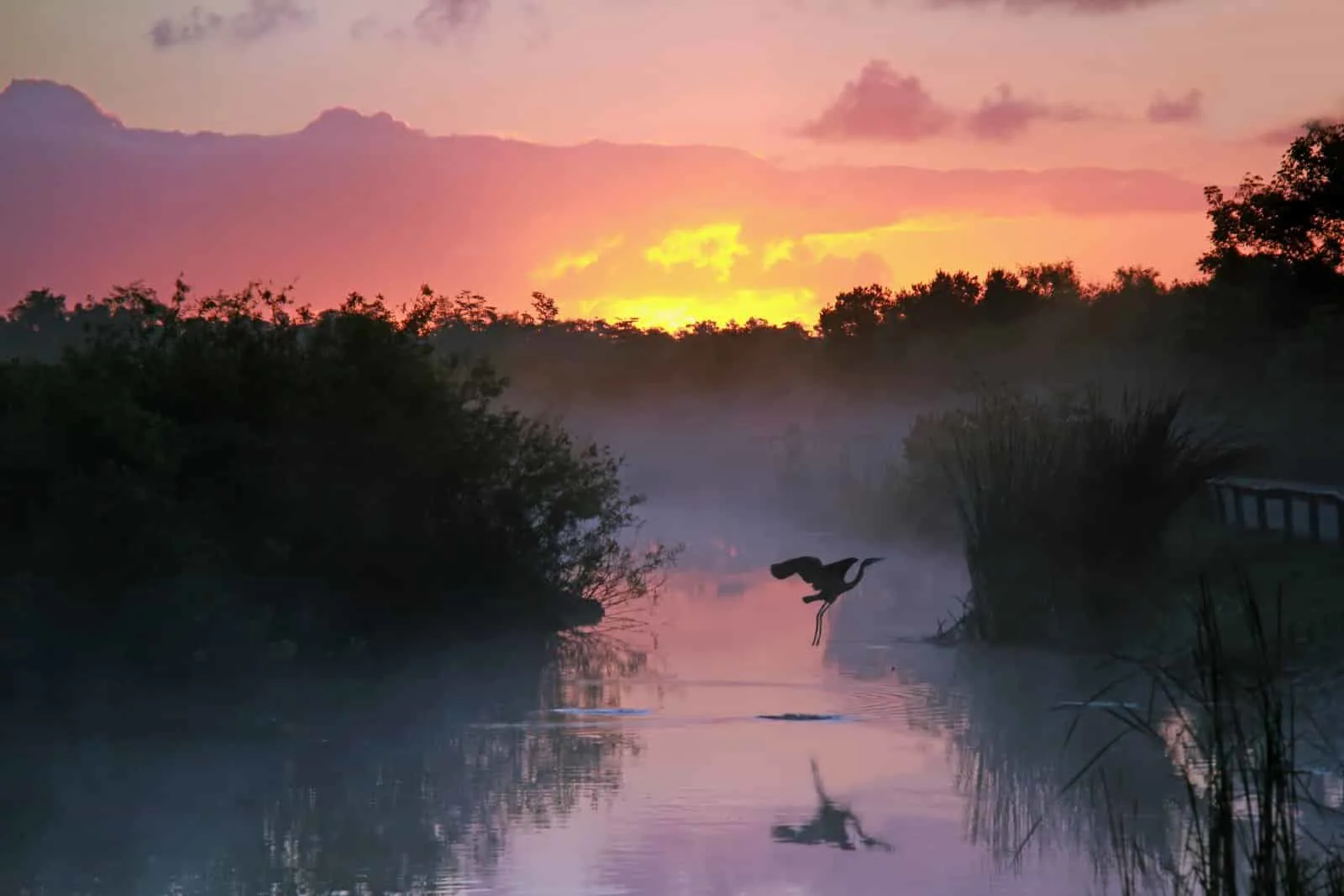
Image Credit: Shutterstock / Brian Lasenby
The Everglades National Park in Florida presents a vastly different canoeing experience, inviting paddlers into the heart of its famous wetlands. This UNESCO World Heritage site is the largest tropical wilderness of any kind in the U.S., offering a network of mangroves, lakes, and slow-moving rivers. Canoeing here is about more than just learning to paddle; it’s an opportunity to glide through a landscape teeming with wildlife, including alligators, manatees, and a vast array of bird species. The park’s water trails, such as the Wilderness Waterway, offer routes ranging from a few hours to several days.
Insider’s Tip: Take a guided moonlight paddle to experience the unique atmosphere of the Everglades at night and observe nocturnal wildlife.
When to Travel: The dry season, from November to March, offers cooler temperatures and fewer mosquitoes, making it the best time for canoeing and camping.
How to Get There: The park has several entrances, with the closest major airport located in Miami. From there, it’s a short drive to the park’s visitor centers, where canoe rentals and tours are available.
10. The Norwegian Fjords, Norway
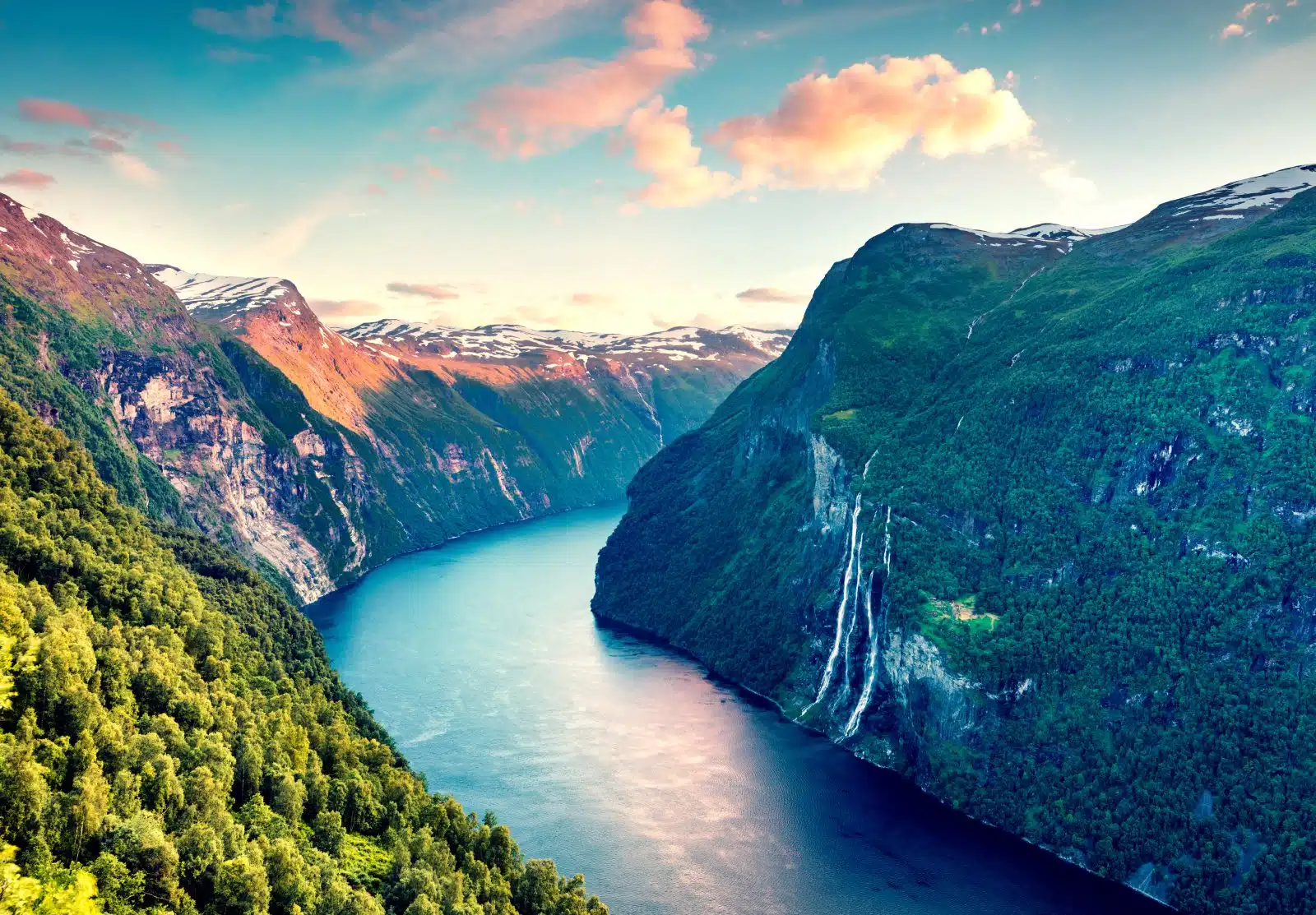
Image Credit: Shutterstock / Andrew Mayovskyy
Norway’s fjords offer some of the most dramatic landscapes for canoeists, with steep mountains rising directly from the sea, waterfalls cascading down cliffs, and deep, serene waters. Paddling in the fjords, such as Geirangerfjord or Nærøyfjord, offers a peaceful yet exhilarating experience, suitable for beginners due to the calm and sheltered waters. Canoeing here allows for an up-close view of the fjords’ majestic beauty, which is inaccessible by any other means. It’s also an opportunity to engage with Norway’s rich maritime history and Viking heritage.
Insider’s Tip: Opt for a guided tour to learn about the fjords’ geology, history, and wildlife from local experts.
When to Travel: The best time is from late spring to early autumn, with June to August offering the longest days and mildest weather.
How to Get There: International flights arrive in cities like Oslo and Bergen. From there, domestic flights, trains, or car rentals can take you closer to the fjords, where canoeing tours and equipment rentals are widely available.
The Bottom Line
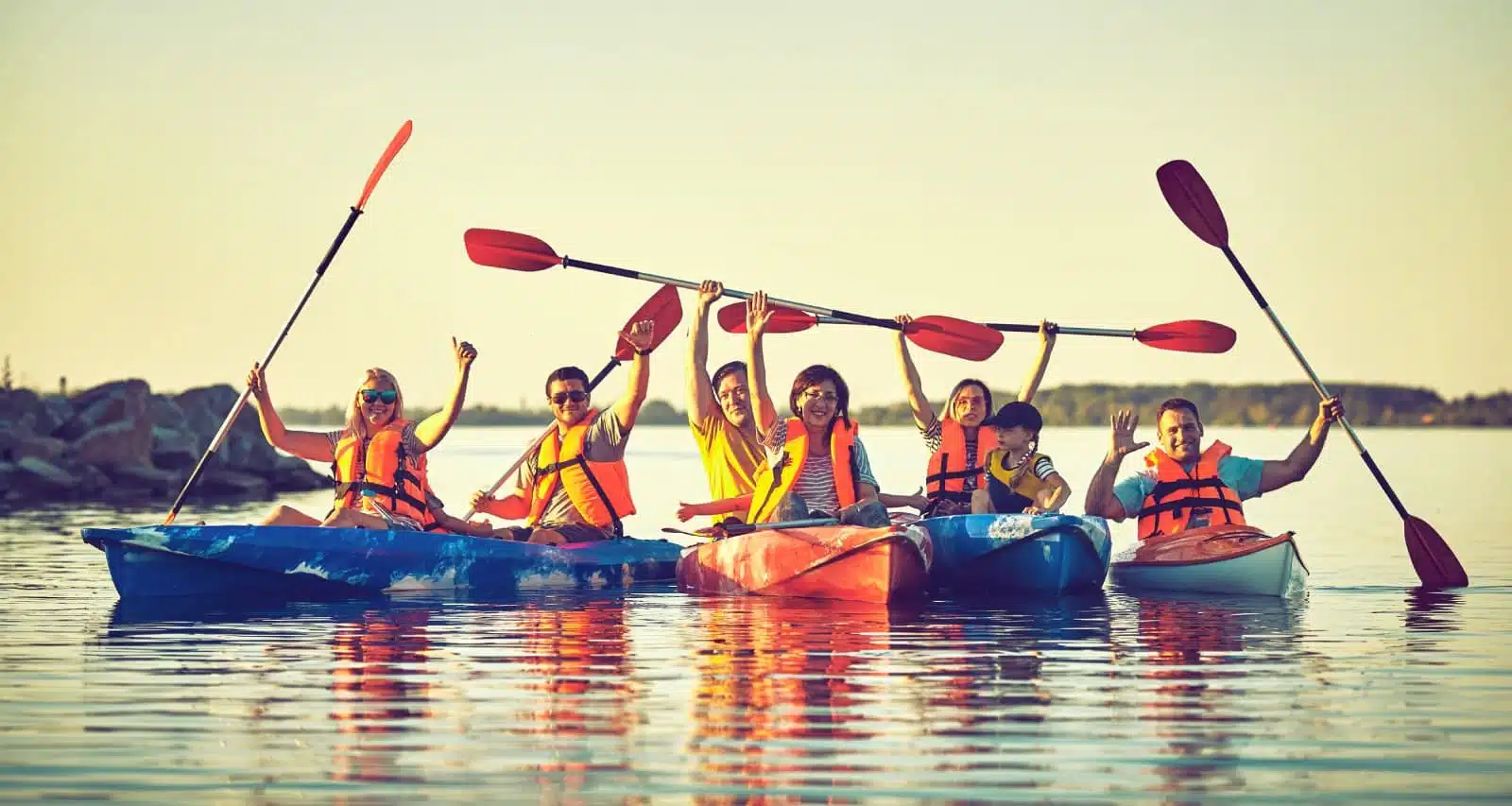
Image Credit: Shutterstock / mbHY!8e7y5NzXvx
Embarking on a canoeing journey is about mastering a new skill and an invitation to explore some of the world’s most enchanting waterscapes. From the Boundary Waters’ serene wilderness to Norway’s dramatic fjords, each destination offers a unique setting for learning and adventure. As you paddle through these waters, remember that canoeing is as much about connecting with the environment as it is about navigating it.
More From The Green Voyage
Top 10 Trending Travel Destinations 2024
6 Essential Banking Apps for International Travel – Managing Your Finances on the Go
Traveling With Kids – 10 Tips to Create Memorable Family Holidays
The post The 10 Best Places for Learning to Canoe – Paddling on Lakes and Rivers 2024 first appeared on The Green Voyage.
Featured Image Credit: Shutterstock / EB Adventure Photography.
For transparency, this content was partly developed with AI assistance and carefully curated by an experienced editor to be informative and ensure accuracy.
Tips for Trip Success
Book Your Flight
Find an inexpensive flight by using Kayak, a favorite of ours because it regularly returns less expensive flight options from a variety of airlines.
Book Your Hotel or Special Accommodation
We are big fans of Booking.com. We like their review system and photos. If we want to see more reviews and additional booking options, we go to Expedia.
You Need Travel Insurance!
Good travel insurance means having total peace of mind. Travel insurance protects you when your medical insurance often will not and better than what you get from your credit card. It will provide comprehensive coverage should you need medical treatment or return to the United States, compensation for trip interruption, baggage loss, and other situations.Find the Perfect Insurance Plan for Your Trip
